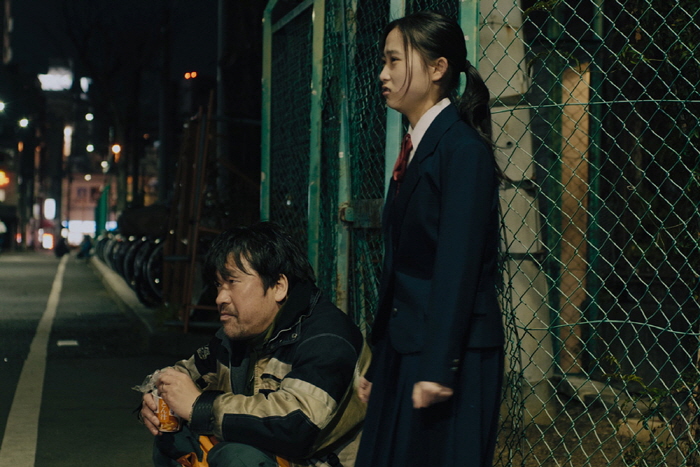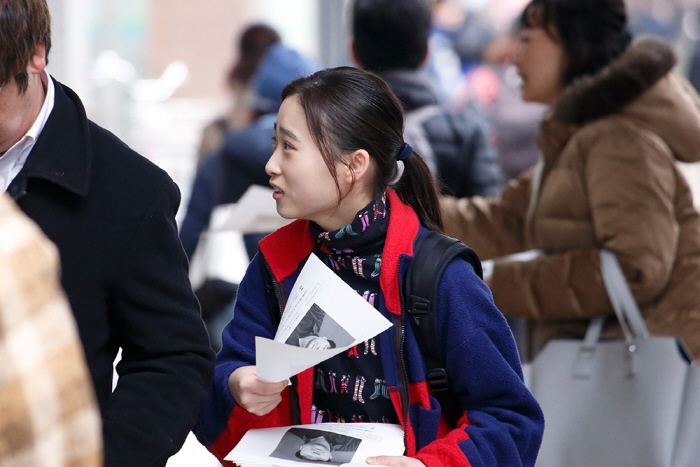It is rather difficult to describe the plot of “Missing”, a dark and disturbing Japanese mystery thriller film which pulls some surprises for us as unexpectedly shifting from one narrative point to another. I will be discreet here as much as possible, but I recommend you to stop reading this inconsequential review of mine and then check out the movie first, especially if you fully enjoy how deftly it manipulates your expectation as phlegmatically doling out a number of surprising things for you.
At the beginning, the movie succinctly establishes the relationship between its two main characters: a shabby loser dude named Santoshi Harada (Jirô Satô) and his adolescent daughter Kaeda (Aoi Itô). Since his wife died some time ago, Santoshi has been quite depressed in addition to having a serious financial problem, but he usually procrastinates or drinks whenever he is doing menial jobs, and he certainly frustrates Kaeda a lot when he causes another trouble to be handled by her.
On one day, Kaeda is baffled to find her father unexpectedly gone early in the morning without any explanation, and she becomes more worried as not being able to locate her father during next several days. At one point, she manages to locate where he has recently worked, but “Santoshi Harada” she meets at that spot is someone else, and then there comes a text message which suggests that her father abandoned her and then ran away to somewhere.
While understandably quite confused and exasperated, Kaeda comes to pay more attention to what her father told her not long before his inexplicable disappearance. He said he spotted a certain figure wanted by the police for a shocking serial killing case, and, what do you know, this wanted figure, Terumi Yamauchi (Hiroya Shimizu), turns out to be the very person she met at her father’s recent workplace. It is quite possible that her father attempted to track down this wanted figure for the considerable promised reward, and Kaeda naturally begins to wonder whether this guy is responsible for her father’s disappearance.
Kaeda eventually decides to delve more into the matter, but then the situation becomes trickier than expected when she subsequently confronts Terumi, who turns out to be quite nearer to her than she thought at first. It seems that Terumi does know something about her father’s disappearance, but he still does not reveal anything while cruelly teasing Kaeda, though she manages to get a few clues for her private investigation. It later turns out Terumi was in a nearby island for some reason, and Kaeda is certainly willing to go there for getting any more clue about her father’s whereabouts.
Around that narrative point, the screenplay by director Shinzô Katayama and his co-writers Kazuhisa Kotera and Ryô Takada takes several plot turns mainly for showing more of how twisted Terumi really is. He usually finds his targets via his several anonymous Twitter accounts, and his targets, who incidentally have each own death wish, are willing to be killed by him, though many of them only come to exemplify that old saying: “Be careful of what you wish – you might get it”.
I will let you to see for yourself how this part is connected with Kaeda’s narrative a lot more than expected, but I can tell you instead that I admire how the screenplay dexterously plays with our expectation with some morbid sense of black humor. In case of a scene between Terumi and one minor supporting character who turns out to be quite naughty in his own way, the movie decidedly makes us more uncomfortable as Terumi is reminded of what really makes him tick, and this depravity of his makes a big contrast with his banal appearance on the surface.
However, the movie eventually comes to pay more attention to Kaeda and her relationship with her father, which eventually becomes the emotional center of the story. In case of a little poignantly bittersweet moment involved with a seemingly simple ping pong match, you may scratch your head a bit about what is exactly happening on the screen, but this moment feels devastating nonetheless with an indelible impression on us.
The three main cast members of the film are solid in their respective parts. While Aoi Itô holds the center as the most sympathetic character in the bunch, Jirô Satô effortlessly clicks well with Itô during several key scenes in the film, and we can instantly sense a long history between their characters even though their characters do not tell that much about their shared past. As another crucial part of the story, Hiroya Shimizu did a good job of embodying his character’s diabolical sides without showing them off at all, and the movie thankfully does not overplay his character’s vile and nihilistic depravity even during its most unnerving moments.
On the whole, “Missing” is another recent notable Japanese film to watch, and I appreciated its skillful handling of plot and characters even though I became rather distant to it at times. Although it may be a little too dark and disturbing for you, it will engage and then surprise you more than expected, and it is certainly nice to see that Japanese cinema still can provide something other than the works of Hirokazu Kore-eda and Ryusuke Hamaguchi.










